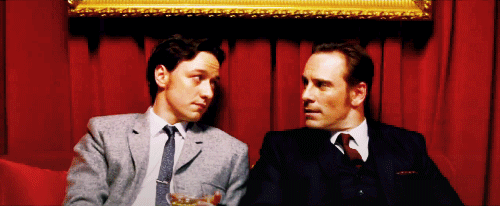Dir.: Matthew Vaughn
With: James McAvoy, Michael Fassbender, Kevin Bacon
To hell with art history, I want to be a mutant in the 60s!
I have never been an X-Men fan, I've always found the stories quite dull and the acting unconvincing (apart from Ian McKellen and Patrick Stewart of course) and to be perfectly honest, I have a very vague idea of what happened in the first few films as I watched them all in a drunken stupor on a plane. The only reason why I went to see “X-Men: First Class” is because both James McAvoy and Michael Fassbender are in it – they are the two young(ish) Celts I kept my eye on for ages. The film also has a 98% approval rating on rottentomatoes, something not to be trifled with.
I probably would not go as far as the rottentomatoes people giving it a near-perfect review – however, I do think that this was a very solid piece of blockbuster filmmaking. First of all, the story itself is pretty fascinating; the human drama element interwoven into the action was cleverly written and quite touching. The film is set in the era before the first X-Men films and tells us the background story of the two main mutants: Charles Xavier, later Professor X, (James McAvoy) and Erik Lehnsherr/Magneto (Michael Fassbender), their childhood, friendship and the roots of their subsequent hostility. Moreover, we get an insight into why certain mutants ended up on their respective sides (lurve is often the reason), why Professor X is in a wheelchair and many more answers to other burning questions. The movie opens in the 1930s at a Nazi concentration camp in Poland where we meet Erik for the first time as a Jewish boy who loses his mother. The whole sequence of Erik’s childhood was heartbreaking and it explained the reason behind his hardened soul as Magneto. Charles Xavier, on the other hand, enjoyed the pleasures of a privileged upbringing in the English countryside. As the two characters grow up and meet each other, their onscreen chemistry is an absolute pleasure to watch, they are both very fine actors with tonnes of charisma and plenty of twinkle in their eyes.
The first half of the film in particular could be described as an homage to Sean Connery’s Bond movies, Mad Men and the 60s in general. The beautiful interiors, sexism and the über-kitschness of the montages brings up all these associations. The US war room was an exact copy of the famous war room from “Dr Strangelove”. January Jones of Mad Men was also in the movie, sporting a white leather two-piece suit. Matthew Vaughn, whose previous work includes “Kick-Ass”, is definitely a director with a flare. It was evident that he tried to steer clear from the traditional superhero genre and create something that was true to the cultural legacy of its decade. Michael Fassbender, in his turtlenecks and fitted leather jackets, reminded me of the young Sean Connery, his overwhelming masculinity and the sense of danger he exuded. He would probably make an excellent Bond if Daniel Craig grows weary.
The second half of the film is dedicated mainly to the Cuban Missile Crisis and the mutants’ involvement in it. This part is far too long and just loses the plot and the innovation of the first one. Although, there were some impressive special effects and someone in the audience cried ‘oh my fuck!’ at one point, so yes, the effects were cool. Other than that, the second half is a typical example of superhero blah. There were also many languages spoken throughout, I found that it was the first time for this kind of Hollywood production that whatever the actors said in a foreign language actually made sense and fitted with the story. Michael Fassbender, who is half-German anyway, spoke German, French and Spanish and Kevin Bacon, who was the main villain, spoke German and Russian. He gets my vote for the linguist of the film award as his was by far the best spoken Russian in a non-Russian film ever.
Overall, although not perfect, “X-Men: First Class” shows that with good actors, clever script and a certain daring to go beyond conventions, any film of any genre can become an entertaining, elegant and at times quite emotional spectacle for most audiences. Of course it is hard to achieve and keep up this quelque chose that most good movies have; the importance of a sense of style and the advantages of borrowing from the filmmakers of the past rather than following current trends are clearly displayed here, especially in the contrast between the first and second halves. The small touches like Hugh Jackman’s short but awesome cameo suggest that this was an attempt to make a film with love and care by people with imagination but that they kind of lost it on the way.

No comments:
Post a Comment